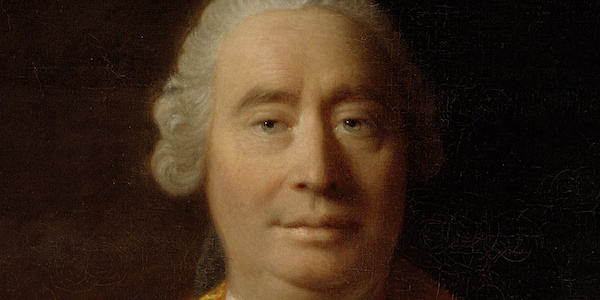Podcast: Play in new window | Download
Subscribe: Spotify | Email | RSS
 In this episode, Dr. Craig A. Evans and I discuss the surprising and bold methodological claims about doing history in chapter 4 of Dr. Ehrman’s How Jesus Became God.
In this episode, Dr. Craig A. Evans and I discuss the surprising and bold methodological claims about doing history in chapter 4 of Dr. Ehrman’s How Jesus Became God.
Along the way we bring up such topics as Joseph Smith, the Book of Mormon, the historicity of the New Testament gospels, the views of David Hume (pictured above) on belief in miracles, the probability of miracles, Paul’s religious experiences, writing outside of one’s area of expertise, and the usable life of ancient papyri.
Here’s part of the discussion of Hume in Paley’s Evidences of Christianity that I refer to:
But the short consideration which, independently of every other, convinces me that there is no solid foundation in Mr. Hume’s conclusion, is the following. When a theorem is proposed to a mathematician, the first thing he does with it is to try it upon a simple case, and if it produce a false result, he is sure that there must be some mistake in the demonstration. Now to proceed in this way with what may be called Mr. Hume’s theorem. If twelve men, whose probity and good sense I had long known, should seriously and circumstantially relate to me an account of a miracle wrought before their eyes, and in which it was impossible that they should be deceived: if the governor of the country, hearing a rumour of this account, should call these men into his presence, and offer them a short proposal, either to confess the imposture, or submit to be tied up to a gibbet; if they should refuse with one voice to acknowledge that there existed any falsehood or imposture in the case: if this threat were communicated to them separately, yet with no different effect; if it was at last executed; if I myself saw them, one after another, consenting to be racked, burnt, or strangled, rather than live up the truth of their account;–still if Mr. Hume’s rule be my guide, I am not to believe them. Now I undertake to say that there exists not a sceptic in the world who would not believe them, or who would defend such incredulity.
Instances of spurious miracles supported by strong apparent testimony undoubtedly demand examination; Mr. Hume has endeavoured to fortify his argument by some examples of this kind. I hope in a proper place to show that none of them reach the strength or circumstances of the Christian evidence. In these, however, consists the weight of his objection; in the principle itself, I am persuaded, there is none.
This episode is also available on youtube.
Links:
- Paley’s Evidences of Christianity.
- David Hume’s chapter of his Enquiry in which he argues that it is never rational to believe any report of a miracle, modernized by philosopher Jonathan Bennett (starts on p. 55).
- Hume’s Abject Failure by John Earman.
- A blog post on Dr. Bart Ehrman’s methodology by Dr. Michael J. Kruger.
- How God Became Jesus – the evangelical response book to which Dr. Evans contributed.


Dale, kudos for the congenial discussions you’ve had with various Trinitarian theologians such as Dr. Evans. And kudos to Dr. Evans for his willingness to discuss Ehrman’s book on your podcast. I am hopeful that your approach will encourage future dialog along the same lines between other Unitarian and Trinitarian scholars.
Dale,
It never ceases to amaze me how some modern (mainly Roman Catholic) scholars try to ‘shoe-horn’ bits and pieces of information into the Doctrine of the Trinity.
How many contributors to your site have said ‘ we are trying to show how the originators of the doctrine might have rationalised their belief” ?
The problem they all face is that none of their musings are supported by the scriptures.!!!
If you are a Catholic you are generally not too worried since you are less concerned about ‘sola scriptura’ and more interested in the Early Church Fathers.
If you are a Protestant you are ‘up the creek without a paddle’ since you insist on ‘sola scriptura’ —
and the doctrine is without scriptural support. (something the Catholics understand)
Trinitarians claim that Unitarians are ‘rationalists’.
Judging by their musings it is clearly the Trinitarians who are the rationalists!
Who could ever have believed that humans could engage in the ‘gymnastics’ and nonsensical metaphysical musings to support something which is ultimately unsupportable – a ‘dead donkey’
Blessings
John
This doesn’t have to do with the present post, but I’d love to see a public response from Dale to Tom Belt and Dwayne Polk’s recent posts on the Trinity at An Open Orthodoxy. They do mention how a new category should be added to Dale’s taxonomy.
http://anopenorthodoxy.wordpress.com/2014/05/05/toward-the-trinity/
http://anopenorthodoxy.wordpress.com/2014/05/05/schrodingers-god/
Thanks, David – my error. It is there now.
Hi Dale
I can’t find the mp3 button!
regards
David
Pingback: Ehrman and Christology in the Blogosphere
Comments are closed.